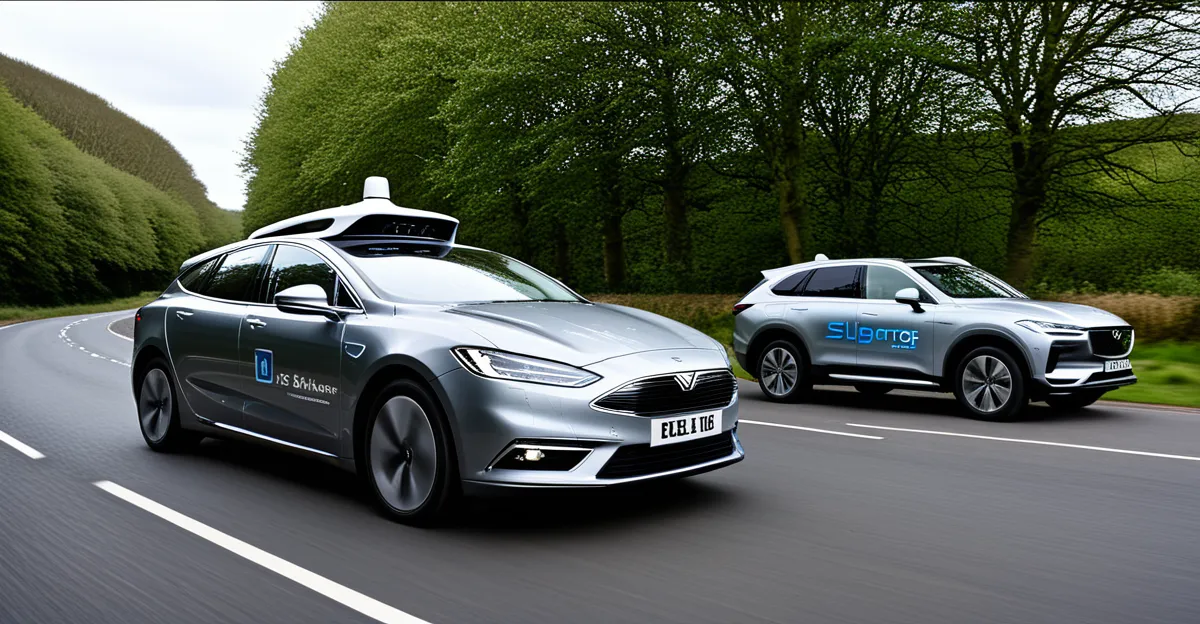Overview of Autonomous Vehicles in the UK Automotive Industry
The UK automotive industry is rapidly embracing autonomous vehicles UK as a transformative force reshaping its landscape. Currently, the development and adoption of autonomous vehicles in the UK span a wide range of vehicle types, from passenger cars with advanced driver-assistance systems to fully self-driving shuttles and delivery robots. This diversity highlights the UK’s commitment to exploring various applications of automation.
Key transformation drivers include advances in vehicle technology, government policies supporting innovation, and growing consumer acceptance. Autonomous vehicle trends in the UK also reflect a strategic push to integrate smart mobility solutions that reduce congestion and enhance road safety.
In the same genre : What Are the Latest Advancements in UK’s Automotive Technology?
The UK automotive industry benefits from a dense ecosystem of manufacturers, tech developers, and research institutions collaborating to accelerate autonomous vehicle deployment. This collaboration boosts the scope of tested autonomous vehicle models and encourages piloting in urban and rural settings, ensuring a well-rounded understanding of practical use cases.
In summary, the autonomous vehicle trends underscore the UK’s ambition to position itself as a leader in this evolving market. The ongoing advancements promise to create a more efficient, sustainable, and connected transportation future for the country.
Also to read : How Are Technological Innovations Reshaping the Future of UK Automotive Manufacturing?
Technological Advancements Driving Change
Autonomous vehicle technology UK is evolving rapidly, powered by breakthroughs in sensors, artificial intelligence (AI), and connectivity. These innovations form the foundational layers enabling self-driving cars UK to perceive environments accurately, make decisions, and communicate with infrastructure and other vehicles. For instance, lidar and radar sensors collect detailed spatial data, while AI algorithms analyze this information to navigate complex traffic scenarios safely.
Collaboration plays a pivotal role in this advancement. Leading universities and automotive companies in the UK engage in joint research, fostering innovation in automotive design and control systems. Such partnerships accelerate development cycles and support knowledge transfer between academia and industry, addressing technical challenges more effectively.
Moreover, the UK hosts numerous real-world pilot programmes and testbeds designed to validate autonomous vehicle technology under diverse conditions. Cities like Milton Keynes and Coventry serve as living labs where autonomous shuttles and delivery robots undergo rigorous testing. These projects not only refine technology but also generate valuable data on user interaction and operational performance, shaping future autonomous vehicle technology UK strategies. This integrated approach ensures the UK remains at the forefront of innovation in automotive autonomy.
Impact on UK Automotive Manufacturers
The automotive manufacturing UK sector is undergoing significant transformation due to the rise of autonomous vehicles UK. Traditional manufacturers are adapting by revising production lines to incorporate advanced sensor arrays, AI integration, and connectivity modules essential for self-driving cars UK. This shift demands investments in new machinery and software capabilities, redefining vehicle production processes.
A crucial strategy involves partnerships between established automotive original equipment manufacturers (OEMs) and emerging technology firms. For example, collaborations facilitate access to cutting-edge autonomous vehicle technology UK, enabling faster incorporation of innovations into mass production. These alliances also allow UK manufacturers to bridge gaps in software expertise and hardware design, vital for competitive positioning in the evolving market.
Leading UK automotive companies are piloting modular production systems that support both conventional and autonomous vehicle models on shared lines, enhancing flexibility and reducing costs. Furthermore, some manufacturers are developing dedicated autonomous vehicle platforms, reflecting a commitment to long-term industry adaptation. This transition not only reshapes manufacturing but also influences supply chain dynamics, with increased demand for high-tech components and specialized suppliers.
By strategically evolving production and fostering tech partnerships, the UK automotive manufacturing sector strengthens its role in the global autonomous vehicle landscape, poised to meet both current demands and future challenges effectively.
Economic Implications of Autonomous Vehicle Adoption
The economic impact autonomous vehicles UK creates extends deeply into the UK’s automotive market and beyond. As autonomous vehicles gain traction, significant shifts in investment patterns and market value are evident. Increased funding targets autonomous vehicle technology UK, prompting accelerated development and commercialization efforts.
Jobs and growth in the UK automotive industry respond dynamically. While some traditional roles face displacement, new positions in software development, sensor manufacturing, and data analysis emerge, underscoring a workforce evolution tied to autonomous vehicle trends. Moreover, sectors such as insurance and supply chain logistics undergo transformation. For example, insurance models adjust to new risk profiles linked to self-driving cars UK, while supply chains emphasize high-tech components.
Funding for these shifts combines government initiatives and private sector investments. Government-backed grants and innovation programmes aim to de-risk autonomous vehicle technology R&D, encouraging startups and established firms alike. Private investments focus on scaling production and deployment efforts.
In sum, the economic impact autonomous vehicles UK will likely foster sustainable growth by balancing disruption with innovation, reinforcing the UK’s position as a global leader in automotive investment and market development. This environment encourages adaptability among stakeholders, aligning with evolving autonomous vehicle trends.
Changes in Workforce and Skills Demand
The rise of autonomous vehicles UK is driving a profound workforce transformation automotive sector-wide. Traditional jobs like assembly line work face displacement, while demand surges for advanced roles in software engineering, AI, sensor technology, and cybersecurity. This shift necessitates new skills for autonomous vehicles that blend automotive expertise with digital competence.
To address this, the UK has deployed extensive upskilling and retraining programmes targeting workers at risk of redundancy. For example, initiatives focus on teaching coding, systems integration, and data analysis to equip the workforce for the digital future of automotive manufacturing and maintenance. These programmes are often developed in partnership with industry and educational institutions, ensuring alignment with evolving jobs in automotive UK.
Labor market analyses confirm that although some entry-level roles decline, employment in autonomous vehicle technology and related services grows steadily. The challenge lies in balancing short-term displacement with long-term job creation. Policies and corporate responsibility efforts emphasize continuous learning as essential for career sustainability in an automated environment.
In summary, the evolving automotive sector in the UK mandates comprehensive workforce adaptation to support autonomous vehicle trends, securing a skilled talent pool ready for the future of mobility.
Regulatory Landscape and Government Initiatives
The UK autonomous vehicle regulation framework is evolving to support safe and efficient integration of autonomous vehicles UK into everyday traffic. Key legislation addresses liability, safety standards, and data security to create a cohesive legal environment. For example, laws specify testing requirements and operator responsibilities, ensuring public safety while fostering innovation.
Government policy AV plays a pivotal role in advancing these technologies. Numerous initiatives fund research, development, and pilot projects designed to accelerate deployment. Funding programmes target startups and established companies, encouraging innovation and competitive growth within the UK automotive industry. Additionally, designated test zones across the UK provide controlled environments for real-world trials, helping to validate autonomous vehicle technology under diverse conditions.
Compliance challenges remain a focus, as industry stakeholders emphasize the need for clear, adaptable regulations that accommodate rapid technological changes. Feedback from manufacturers and developers has prompted updates in transport laws UK to streamline approval processes and support interoperability between autonomous systems and traditional traffic.
Together, these regulatory and government initiatives create a balanced framework. They protect public interests and propel autonomous vehicle trends forward, positioning the UK as a progressive hub for automotive autonomy development.
Opportunities and Challenges Moving Forward
The future of autonomous vehicles UK offers substantial opportunities for innovation and economic growth. The UK automotive industry can leverage its strong R&D base to become a global leader in autonomous vehicle technology, attracting investment and creating high-value jobs. Advancements in AI, sensor technology, and connectivity pave the way for enhanced safety and smarter mobility solutions, aligning with evolving autonomous vehicle trends.
However, several challenges persist. Infrastructure readiness remains a critical barrier; roads and communication networks must evolve to support widespread deployment. Public acceptance also influences progress, as concerns about safety, privacy, and reliability affect user trust in self-driving cars UK. Addressing these requires continued education and transparent communication about the technology’s benefits and risks.
Cybersecurity presents another significant hurdle. Autonomous vehicles UK depend on complex software and data exchange, making them vulnerable to cyberattacks. Robust security protocols and regulatory frameworks are essential to mitigate these risks and ensure safe operation.
Despite these challenges, the UK automotive industry’s adaptability and proactive policy environment foster optimism. By integrating technological innovation with societal and regulatory considerations, the sector can navigate obstacles and solidify its prospects in the autonomous mobility revolution.








